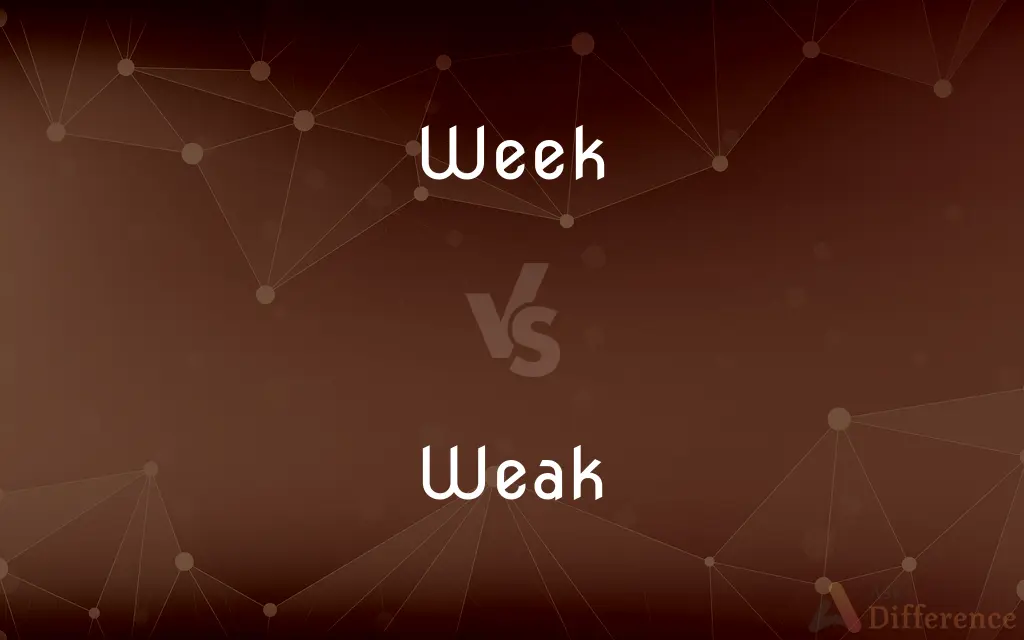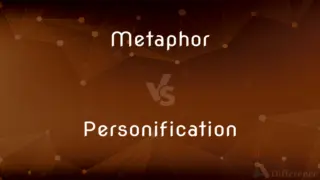Week vs. Weak — What's the Difference?
Edited by Tayyaba Rehman — By Urooj Arif — Updated on March 30, 2024
A week refers to a period of seven days, focusing on time measurement, whereas weak is an adjective describing a lack of strength or power.

Difference Between Week and Weak
Table of Contents
ADVERTISEMENT
Key Differences
A week is a unit of time that comprises seven consecutive days, traditionally considered as starting on Sunday and ending on Saturday in many cultures. On the other hand, weak denotes a state or condition of lacking strength, either physically, mentally, or in terms of substance or argument.
Weeks are significant in organizing schedules, events, and activities within a cultural, religious, or social framework, providing a cyclical structure to time. Weak, however, characterizes insufficiency or inadequacy in various contexts, such as weak materials, weak health, or a weak performance, emphasizing a deficiency rather than a temporal measure.
The concept of a week is universal in the calendar system, serving as a basic unit for planning and time management in personal and professional settings. Conversely, the notion of being weak is subjective, varying greatly depending on the standards or criteria applied, such as physical strength, moral fiber, or argumentative validity.
While weeks are essential for the rhythmic flow of life, marking time through regular intervals, weak points or moments can signify opportunities for growth, improvement, or support, highlighting differences in capacity or resilience.
In essence, while the term week organizes time and activities in a structured manner, weak identifies areas of vulnerability or need, each playing a distinct role in human experiences and perceptions.
ADVERTISEMENT
Comparison Chart
Definition
A period of seven consecutive days.
Lacking strength or vigor.
Usage
Temporal measurement.
Descriptive of strength or quality.
Context
Time management, scheduling.
Physical, mental, emotional state.
Variability
Fixed duration.
Subjective assessment.
Cultural Significance
Marks time in religious, social events.
Indicates need for improvement, support.
Compare with Definitions
Week
A period of seven days.
She plans to visit Paris next week.
Weak
Low in intensity or degree.
She has a weak preference for coffee over tea.
Week
A time unit in planning.
They're booking vacation weeks in advance.
Weak
Lacking physical strength.
After the illness, he felt very weak.
Week
A cycle used for organizing schedules.
The conference spans an entire week.
Weak
Not convincing or insufficient.
The argument presented was weak.
Week
A segment of the calendar.
The first week of April is usually busy.
Weak
Deficient in character or morale.
He's weak-willed and easily influenced.
Week
A measure for recurring events.
We have a meeting scheduled every week.
Weak
Prone to failure or damage.
The weak link in the chain broke.
Week
A week is a time unit equal to seven days. It is the standard time period used for cycles of rest days in most parts of the world, mostly alongside—although not strictly part of—the Gregorian calendar.
Weak
Lacking the power to perform physically demanding tasks; having little physical strength or energy
She was recovering from flu, and was very weak
Week
A period of seven days
A week of rain.
Weak
Liable to break or give way under pressure; easily damaged
The salamander's tail may be broken off at a weak spot near the base
Week
A seven-day calendar period, especially one starting with Sunday and continuing through Saturday
This week.
Weak
Lacking intensity or brightness
A weak light from a single street lamp
Week
A week designated by an event or holiday occurring within it
Commencement week.
Weak
Denoting a class of verbs in Germanic languages that form the past tense and past participle by addition of a suffix (in English, typically -ed).
Week
A week dedicated to a particular cause or institution
Home Safety Week.
Weak
Relating to or denoting the weakest of the known kinds of force between particles, which acts only at distances less than about 10⁻¹⁵ cm, is very much weaker than the electromagnetic and the strong interactions, and conserves neither strangeness, parity, nor isospin.
Week
The part of a calendar week devoted to work, school, or business
Working a three-day week.
Weak
Lacking physical strength, energy, or vigor; feeble.
Week
One week from a specified day
I'll see you Friday week.
Weak
Likely to fail under pressure, stress, or strain; lacking resistance
A weak link in a chain.
Week
One week ago from a specified day
It was Friday week that we last met.
Weak
Lacking firmness of character or strength of will
A weak person unable to cope with adversity.
Week
Any period of seven consecutive days.
Weak
Lacking intensity or strength; faint
Weak light.
A weak voice.
Week
A period of seven days beginning with Sunday or Monday.
Weak
Lacking the proper strength or amount of ingredients
Weak coffee.
Week
A period of five days beginning with Monday.
Weak
Having low prices or few transactions
A weak market for oil stocks.
Week
A subdivision of the month into longer periods of work days punctuated by shorter weekend periods of days for markets, rest, or religious observation such as a sabbath.
A 4-day week consists of Monday, Tuesday, Wednesday, and Thursday.
Weak
Lacking the ability to function normally or fully
A weak heart.
Week
(postpositive) Seven days after (sometimes before) a specified date.
Weak
Unable to digest food easily; readily nauseated
A weak stomach.
Week
A period of seven days, usually that reckoned from one Sabbath or Sunday to the next.
I fast twice in the week.
Weak
Lacking or resulting from a lack of intelligence
A weak mind.
Weak reasoning.
Week
Any period of seven consecutive days;
It rained for a week
Weak
Lacking aptitude or skill
A weak student.
Weak in math.
Week
A period of seven consecutive days starting on Sunday
Weak
Lacking persuasiveness; unconvincing
A weak argument.
Week
Hours or days of work in a calendar week;
They worked a 40-hour week
Weak
Lacking authority or the power to govern
A weak ruler.
Weak
Of, relating to, or being those verbs in Germanic languages that form a past tense and past participle by means of a dental suffix, as start, started; have, had; bring, brought.
Weak
Of, relating to, or being the inflection of nouns or adjectives in Germanic languages with a declensional suffix that historically contained an n.
Weak
Unstressed or unaccented in pronunciation or poetic meter. Used of a word or syllable.
Weak
Designating a verse ending in which the metrical stress falls on a word or syllable that is unstressed in normal speech, such as a preposition.
Weak
Lacking in force (usually strength) or ability.
The child was too weak to move the boulder.
They easily guessed his weak computer password.
Weak
Unable to sustain a great weight, pressure, or strain.
A weak timber; a weak rope
Weak
Unable to withstand temptation, urgency, persuasion, etc.; easily impressed, moved, or overcome; accessible; vulnerable.
Weak resolutions; weak virtue
Weak
Dilute, lacking in taste or potency.
We were served stale bread and weak tea.
Weak
(grammar) Displaying a particular kind of inflection, including:
Weak
Regular in inflection, lacking vowel changes and having a past tense with -d- or -t-.
Weak
Showing less distinct grammatical endings.
Weak
Definite in meaning, often used with a definite article or similar word.
Weak
(chemistry) That does not ionize completely into anions and cations in a solution.
A weak acid;
A weak base
Weak
(physics) One of the four fundamental forces associated with nuclear decay.
Weak
(slang) Bad or uncool.
This place is weak.
Weak
Having a narrow range of logical consequences; narrowly applicable. (Often contrasted with a strong statement which implies it.)
Weak
Resulting from, or indicating, lack of judgment, discernment, or firmness; unwise; hence, foolish.
Weak
Not having power to convince; not supported by force of reason or truth; unsustained.
The prosecution advanced a weak case.
Weak
Lacking in vigour or expression.
A weak sentence; a weak style
Weak
Not prevalent or effective, or not felt to be prevalent; not potent; feeble.
Weak
(stock exchange) Tending towards lower prices.
A weak market; wheat is weak at present
Weak
(photography) Lacking contrast.
A weak negative
Weak
Wanting physical strength.
Weak
Deficient in strength of body; feeble; infirm; sickly; debilitated; enfeebled; exhausted.
A poor, infirm, weak, and despised old man.
Weak with hunger, mad with love.
Weak
Not possessing or manifesting intellectual, logical, moral, or political strength, vigor, etc.
Weak
Not able to sustain a great weight, pressure, or strain; as, a weak timber; a weak rope.
Weak
Feeble of mind; wanting discernment; lacking vigor; spiritless; as, a weak king or magistrate.
To think every thing disputable is a proof of a weak mind and captious temper.
Origen was never weak enough to imagine that there were two Gods.
Weak
Pertaining to, or designating, a verb which forms its preterit (imperfect) and past participle by adding to the present the suffix -ed, -d, or the variant form -t; as in the verbs abash, abashed; abate, abated; deny, denied; feel, felt. See Strong, 19 (a).
Weak
Not firmly united or adhesive; easily broken or separated into pieces; not compact; as, a weak ship.
Weak
Resulting from, or indicating, lack of judgment, discernment, or firmness; unwise; hence, foolish.
If evil thence ensue,She first his weak indulgence will accuse.
Weak
Tending toward a lower price or lower prices; as, wheat is weak; a weak market.
Weak
Not stiff; pliant; frail; soft; as, the weak stalk of a plant.
Weak
Not having full confidence or conviction; not decided or confirmed; vacillating; wavering.
Him that is weak in the faith receive ye, but not to doubtful disputations.
Weak
Lacking in good cards; deficient as to number or strength; as, a hand weak in trumps.
Weak
Not able to resist external force or onset; easily subdued or overcome; as, a weak barrier; as, a weak fortress.
Weak
Not able to withstand temptation, urgency, persuasion, etc.; easily impressed, moved, or overcome; accessible; vulnerable; as, weak resolutions; weak virtue.
Guard thy heartOn this weak side, where most our nature fails.
Weak
Lacking contrast; as, a weak negative.
Weak
Lacking force of utterance or sound; not sonorous; low; small; feeble; faint.
A voice not soft, weak, piping, and womanish.
Weak
Wanting in power to influence or bind; as, weak ties; a weak sense of honor of duty.
Weak
Not thoroughly or abundantly impregnated with the usual or required ingredients, or with stimulating and nourishing substances; of less than the usual strength; as, weak tea, broth, or liquor; a weak decoction or solution; a weak dose of medicine.
Weak
Not having power to convince; not supported by force of reason or truth; unsustained; as, a weak argument or case.
A case so weak . . . hath much persisted in.
Weak
Lacking ability for an appropriate function or office; as, weak eyes; a weak stomach; a weak magistrate; a weak regiment, or army.
Weak
Wanting in point or vigor of expression; as, a weak sentence; a weak style.
Weak
Not prevalent or effective, or not felt to be prevalent; not potent; feeble.
Weak
Lacking in elements of political strength; not wielding or having authority or energy; deficient in the resources that are essential to a ruler or nation; as, a weak monarch; a weak government or state.
I must make fair weather yet awhile,Till Henry be more weak, and I more strong.
Weak
Tending towards lower prices; as, a weak market.
Weak
To make or become weak; to weaken.
Never to seek weaking variety.
Weak
Having little physical or spiritual strength;
A weak radio signal
A weak link
Weak
Overly diluted; thin and insipid;
Washy coffee
Watery milk
Weak tea
Weak
Lacking power
Weak
Used of vowels or syllables; pronounced with little or no stress;
A syllable that ends in a short vowel is a light syllable
A weak stress on the second syllable
Weak
Having the attributes of man as opposed to e.g. divine beings;
I'm only human
Frail humanity
Weak
Lacking force; feeble;
A forceless argument
Weak
Lacking physical strength or vitality;
A feeble old woman
Her body looked sapless
Weak
Used of verbs having standard (or regular) inflection
Weak
Lacking physical strength or vigor
Weak
Characterized by excessive softness or self-indulgence;
An effeminate civilization
Common Curiosities
What are examples of being weak?
Examples include physical frailty, weak arguments, and low intensity.
Is weakness always negative?
While often viewed negatively, weakness can also indicate areas for growth or support.
Why is a week seven days long?
The seven-day week has historical roots in ancient civilizations and religious traditions.
Can the term "week" be used in different contexts?
Primarily, "week" is used in the context of time measurement and planning.
How does one improve from being weak?
Improvement can involve physical training, learning, and personal development.
What role do weeks play in planning?
Weeks are fundamental units for planning activities, work, and events.
What defines a week?
A week is defined as a period of seven consecutive days.
How is "weak" commonly used?
"Weak" is used to describe a lack of strength, effectiveness, or conviction.
How do weeks organize time?
Weeks organize time by dividing it into manageable, recurring segments.
Can weakness be physical and mental?
Yes, weakness can be both physical (lack of strength) and mental (lack of resolve or conviction).
Can the meaning of "weak" vary?
Yes, "weak" can vary in meaning, from physical strength to moral character to argumentative validity.
Are all weeks the same length?
Yes, by definition, all weeks are seven days long.
How is weakness perceived in society?
Society often views weakness variably, depending on the context—physically, mentally, or morally.
What's the significance of a week in culture?
Weeks have cultural significance in religious observances, work schedules, and social planning.
Can weakness be a strength?
In some contexts, recognizing one's weaknesses can lead to improvement and be seen as a strength.
Share Your Discovery

Previous Comparison
Metaphor vs. Personification
Next Comparison
Hag vs. SagAuthor Spotlight
Written by
Urooj ArifUrooj is a skilled content writer at Ask Difference, known for her exceptional ability to simplify complex topics into engaging and informative content. With a passion for research and a flair for clear, concise writing, she consistently delivers articles that resonate with our diverse audience.
Edited by
Tayyaba RehmanTayyaba Rehman is a distinguished writer, currently serving as a primary contributor to askdifference.com. As a researcher in semantics and etymology, Tayyaba's passion for the complexity of languages and their distinctions has found a perfect home on the platform. Tayyaba delves into the intricacies of language, distinguishing between commonly confused words and phrases, thereby providing clarity for readers worldwide.













































